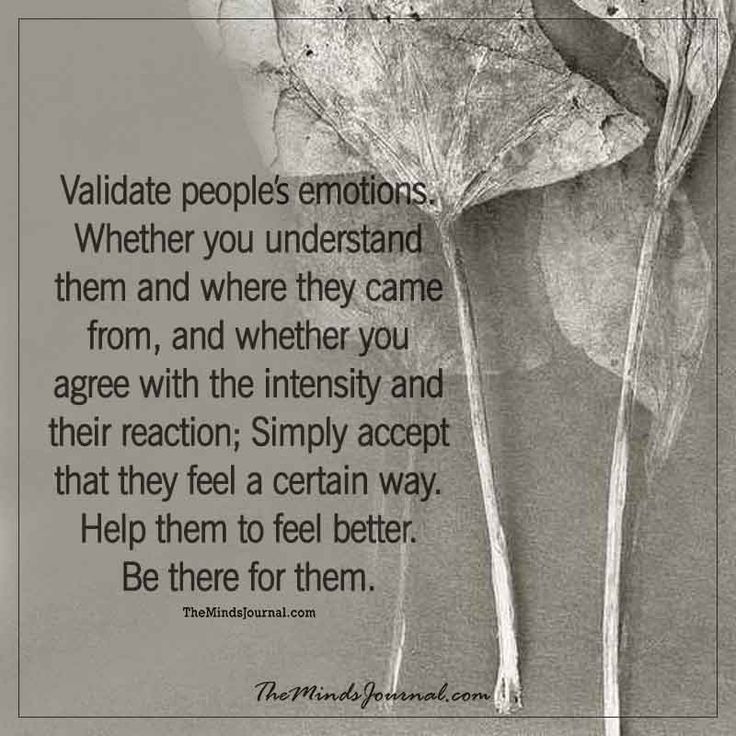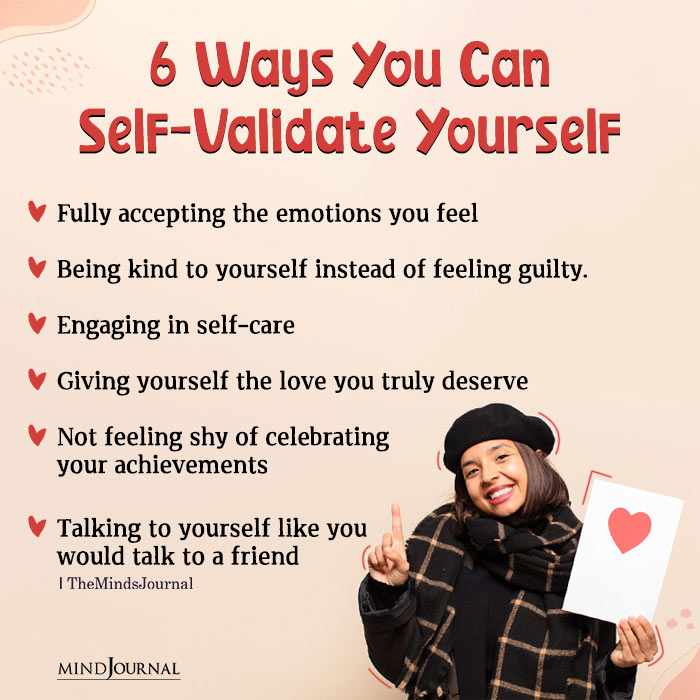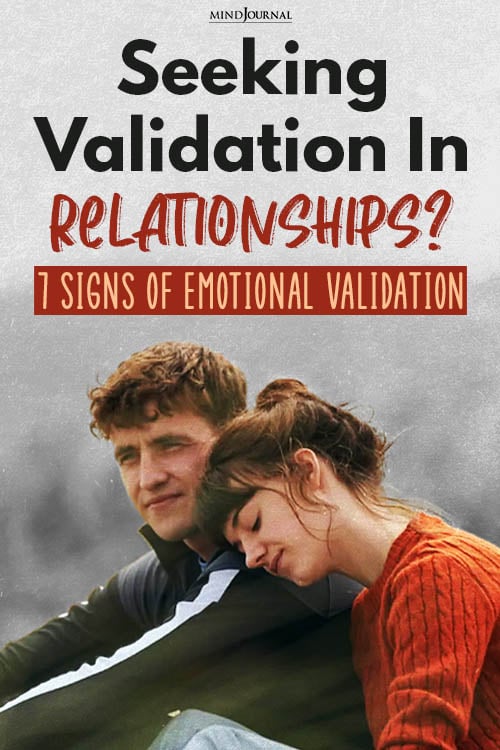Do you ever feel like you are seeking validation in relationships? Have you ever felt like your emotions go unnoticed or misunderstood by your partner? Or maybe you are wondering what does validation in relationships look like?
Emotional validation in relationships is very important and it helps you to feel more connected to your partner.
It’s when someone not only listens but acknowledges and respects how you feel, even if they don’t entirely understand or agree with your emotions.
It strengthens the trust between you two and helps you to build a solid emotional foundation. Today, we are going to talk about what is emotional validation, the signs of emotional validation and how to practice emotional validation as a couple.
First, let’s talk about what is emotional validation.
Related: What Is Self-Validation? Understanding The Importance Of Acknowledging Your Worth
What Is Emotional Validation?
Validation in relationships is really about acknowledging and accepting your partner’s feelings—whether you agree with them or not—without trying to brush them off or change them.
It’s not about saying, “I get exactly why you feel this way,” but more about showing empathy and understanding. When you validate someone’s emotions, it makes them feel heard and respected, which is huge for creating a sense of safety in the relationship.
When both of you feel like your emotions won’t be judged or dismissed, it opens up space for more honest, open conversations. This kind of emotional support builds trust, makes your intimacy deeper and more meaningful, and just makes the whole relationship feel more secure.
Bottom line: emotional validation is a key part of making sure both partners feel emotionally safe and connected.

Are You Seeking Validation In Relationships? 7 Signs of Emotional Validation
1. They actively listen to you.
When your partner truly listens to you—without distractions like their phone or the TV on in the background—that’s one of the biggest signs of emotional validation. They’re not just hearing you so they can respond; they’re actually trying to understand how you’re feeling.
This means they’re making eye contact, maybe nodding, and asking questions if they’re not sure about something. Active listening shows that what you’re saying matters, and they’re really present with you.
This kind of attention helps create a deeper emotional connection because it makes you feel like your emotions are being heard and valued.
2. They always acknowledge your emotions.
If you are seeking validation in relationships, look out for this sign. Acknowledging your partner’s feelings is a big part of emotional validation. It’s about recognizing that their emotions are real, even if you don’t fully get them.
For example, if you are upset, and they say something like, “I can see you’re really hurt right now, and that’s okay” goes a long way. It’s a simple way of saying, “I see you, and I respect how you’re feeling.”
When your partner does this, they’re creating a safe space for you to be open and vulnerable, without fear of being dismissed or ignored.
3. They never judge you.
One of the key parts of emotional validation is making sure there’s no judgment. They make you feel like you can express any emotion—whether it’s frustration, sadness, or even happiness—without the fear of being criticized or mocked.
For example, if something seems small to them but is really bothering you, validating your feelings means they won’t laugh it off or brush it aside. Instead, they accept that your emotions are valid to them, which helps create trust and safety in your relationship.
4. They give you emotional support without constantly trying to fix things for you.
Sometimes, your partner doesn’t try to “fix” your problem— they are just there for you and listen. Offering support doesn’t always mean offering solutions.
Sometimes emotional validation in relationships is as simple as saying, “I’m here for you, and this sounds really tough,” rather than jumping straight into problem-solving mode.
By just being emotionally present, they’re showing you that they care and that you don’t have to go through tough moments alone.
Related: Invalidation and Narcissism: Why They Slowly Erase You
5. They try to reflect back what you are saying and feeling.
One of the biggest signs of emotional validation is this. A great way to show emotional validation is by reflecting back what your partner is feeling. For example, if they’re talking about work stress, you might say, “It sounds like you’re feeling really overwhelmed by everything going on.”
When you reflect their emotions back to them, it shows you’re truly listening and understanding. It also opens up space for deeper conversations and helps you connect on a more emotional level.
6. They are mature enough to accept emotional differences.
Validation doesn’t mean you always have to feel the same way your partner does—it’s about accepting their feelings as real, even if you don’t fully understand them.
For example, if your partner is feeling anxious about something that doesn’t worry you, you can say, “I might not feel the same way, but I understand why this is bothering you.”
This shows them that their emotions are valid, even if they differ from yours. Accepting these differences strengthens your bond and helps create a more supportive relationship.
7. They create a safe space for you to fully express your emotions.
If you are seeking validation in relationships, look out for this sign. Letting you fully express your emotions, without interrupting or rushing you, is another way to validate how you’re feeling.
When you needs to talk, your partner gives you the space to do so. They never cut you off or change the subject—they simply listen.
Even if you need time to gather your thoughts, being patient and giving you the floor shows that they respect your feelings and that you don’t need to hurry through expressing them.
Okay, now that we know the signs of emotional validation in relationships, let’s talk about how to practice emotional validation as a couple.
How to Practice Emotional Validation as a Couple
1. Make sure you communicate openly.
Make it a point to be open and honest with each other. Let your partner know that you’re there to listen, and that they can share how they’re feeling without worrying about being judged.
Open communication is the foundation of emotional validation in any relationship.
2. Empathize with one another.
Try to put yourself in your partner’s shoes. Even if you don’t agree with how they’re feeling, understanding things from their perspective helps you connect emotionally.
Empathy helps build closeness and shows that you care about their emotional experience.
Related: How To Overcome Imposter Syndrome? 9 Ways To Stop Doubting Yourself And Start Thriving
3. Avoid interrupting them when they are opening up to you.
How to practice emotional validation as a couple? Give your partner the space to finish what they’re saying without interrupting.
It might seem like a small thing, but waiting until they’re done shows that you value their thoughts and feelings. It’s an easy way to make them feel heard and understood.

4. Try to use “I” statements as much as you can.
When you’re talking about your own feelings, use “I” statements instead of “you” statements. This helps keep the conversation focused on sharing emotions, not assigning blame.
For example, say, “I feel upset when that happens,” instead of, “You always do this and it makes me mad.” This approach keeps things more empathetic and helps both of you feel heard.
5. Check in with them regularly.
If you are wondering how to practice emotional validation as a couple, then keep this in mind. Even if things seem calm or normal, checking in with your partner about how they’re feeling is important.
Simple questions like, “How are you feeling today?” show that you care about their emotional well-being and are ready to support them whenever they need it.
Bottomline
Emotional validation in relationships is a huge part of any strong, healthy bond. It’s about listening, accepting, and supporting your partner’s emotions without judgment. When you practice emotional validation, you create a safe space where both of you feel valued and understood.
It’s not about always agreeing but about showing empathy and respect for each other’s emotional experiences.
Related: Do You Crave Love? 7 Signs Of Emotional Hunger
So, the next time your partner opens up, take a moment to really listen and validate their feelings. You’ll be amazed at how much it strengthens your bond!










Leave a Reply